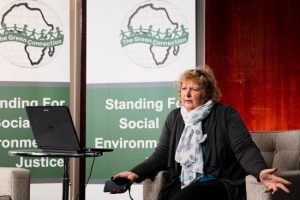The Green Connection and Natural Justice on Friday, May 10, 2024, submitted comments on the revised Environmental Impact Assessment report (EIA) concerning the offshore oil and gas Exploration Right (ER) for Block 3B/4B. The comments were supported by Masifundise Development Trust.

Located off the West Coast, the project raises significant concerns regarding its potential risks and negative impacts to some of South Africa’s most precious marine ecosystems and the ripple-effect for coastal communities and their livelihoods. The eco-justice organisations also emphasise that this, and other such projects, are in direct contradiction with South Africa’s climate commitments, which should see a reduction in the reliance on carbon-emitting fossil fuels.
The Green Connection’s Liziwe McDaid stresses the catastrophic consequences of potential spills. She says, “The impact of spills, even minor ones, could devastate affected marine ecosystems, endangering fish species, which underpin local fisher livelihoods. And there is always a threat of a spill, no matter how these may be downplayed, which could jeopardise the delicate balance of marine ecosystems and the livelihoods of coastal communities. Our submission outlines various scenarios of oil spills, ranging from minor to severe. Each scenario poses significant potential impacts on fisher livelihoods, which can include job losses, market disruptions, and economic hardships for communities reliant on seafood trade.”
The revised EIA report – compiled by Environmental Impact Management Services (EIMS) – comes after a public review resulted in overwhelming opposition and concerns regarding the potential environmental and socio-economic impacts. However, the revision fails to adequately address these concerns and exposes the stark disconnect between corporate profit motives and public interest. The organisations also argue that the revised EIA report all but completely avoids the urgency for South Africa to move towards a just energy transition for all.
Defending Rights Programme Manager at Natural Justice, Melissa Groenink-Groves, underscored the legal implications. She cautions, “It is imperative to consider the legal framework in evaluating the risks posed by such projects. Environmental regulations and climate commitments must be upheld to protect both ecosystems and communities.”
These sentiments are also echoed by David Mtshali who is the Defending Rights Senior Programme Officer at Natural Justice. He laments the fact that the EIA process followed in respect of the proposed project was not child friendly, did not consider children’s environmental rights, and contravenes the generational equity principle.
The Green Connection’s Community Outreach Coordinator, Neville Van Rooy, says that he is most concerned about how the risks associated with potential spills, coupled with the sheer disregard for the climate crisis and the urgent need to move toward a just energy transition, could completely devastate coastal communities.
He says, “Local livelihoods and ways of life are at stake here. The risks associated with offshore drilling could irreversibly harm coastal communities, their livelihoods and even their very way of life. Furthermore, the cultural and heritage significance of the coastal and marine ecosystem cannot be overlooked. Any harm to these ecosystems could have profound implications for spiritual practices, sense of place, and overall wellbeing of coastal communities. Coastal communities stand to suffer the most from the reckless exploitation of our oceans. Their way of life hangs in the balance.”
Should the project – spearheaded by Africa Oil SA Corp (AOSAC), Ricocure (Pty) Ltd, and Azinam Limited – get the green light, TotalEnergies will be the operator. According to The Green Connection, TotalEnergies is at the forefront of the onslaught on South Africa’s oceans, prioritising profit over people and the planet. Despite overwhelming opposition, TotalEnergies persists in its shortsighted pursuit of offshore oil and gas reserves.
The organisations stress the vital need for decision-makers to prioritise both the long-term health of marine ecosystems and the wellbeing of communities dependent on them. Amidst escalating climate change and increasing social inequality, they urge reflection, emphasising the collective responsibility of government, industry, and civil society to prioritise the environment and people over profit-driven motives. This, they argue, is essential to secure the positive transformation our country needs.
